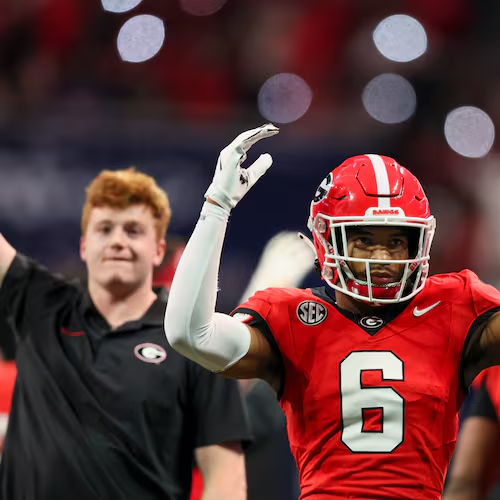One important veteran in Georgia’s secondary is Daylen Everette: “I’m getting old on the field.”
Daylen Everette is an important player in the Georgia Bulldogs’ secondary, and his words, “I’m getting old on the field,” reflect the experience and wisdom that come with years of hard work, dedication, and personal growth. As a key figure in the defensive backfield, his leadership and maturity have helped solidify Georgia’s defense as one of the most formidable in college football.
The Growth of Daylen Everette:
When you look at Daylen Everette’s journey to Georgia, it’s easy to see why he’s so respected on and off the field. Growing up in the competitive world of football, Everette always had an edge when it came to the mental aspect of the game. By the time he joined Georgia, he was already an accomplished player, having gained recognition for his raw talent and instincts as a cornerback. However, like most athletes at the highest level, Everette had to adapt, grow, and mature both physically and mentally. He had to learn to manage the pressures of playing in front of thousands of fans and the ever-present spotlight of college football.
The phrase, “I’m getting old on the field,” isn’t just about age; it’s a recognition of his growth and maturation. In the context of a college football season, a player can have an immense amount of experience even after just a couple of years. Everette’s experience, coupled with the lessons learned through practice, in-game scenarios, and leadership roles, has elevated his level of play. The “old” feeling he refers to could be a nod to the physical grind of a football season, where every game, every play, takes its toll on a player’s body. However, it’s more likely an acknowledgment that he has accumulated the wisdom and experience that only time and consistency can provide.
Everette’s Role in Georgia’s Secondary:
Daylen Everette’s experience is invaluable in Georgia’s secondary, an area of the team that has seen its fair share of standouts in recent years. Under the coaching of defensive coordinator Glenn Schumann, Georgia has built a reputation for developing high-caliber defensive backs. Everette is one of the prime examples of how Schumann’s coaching philosophy has molded talented players into elite performers.
As a cornerback, Everette’s job is to lock down the opposing team’s wide receivers, disrupt the passing game, and provide solid coverage. In Georgia’s defensive system, his versatility is one of his strongest assets. Not only is he capable of being an elite man-to-man cover corner, but he’s also well-versed in zone coverage, where his ability to read quarterbacks and anticipate routes becomes even more crucial. In this capacity, Everette’s veteran presence has proven to be invaluable for the Bulldogs’ defense, especially during critical moments in big games.
Moreover, Everette’s experience allows him to lead by example. Younger players in the secondary look to him for guidance, learning not just the technical skills but the mental fortitude needed to excel at the highest level. This leadership on and off the field is often what separates good teams from great ones, and in Georgia’s case, it’s one of the reasons their defense remains so dominant year after year.
The Impact of Age and Experience:
In college football, the physical demands on players are immense. A single season can seem like a grueling marathon with the wear and tear it puts on a player’s body. For someone like Everette, who has played through multiple seasons at a top-tier program, the “old on the field” comment likely reflects a sense of accumulated experience from all the hits, practices, and games he’s endured.
The mental aspect of playing football is just as important as the physical. Over time, Everette has likely learned to anticipate what offenses are trying to do. His reaction time has improved because of the vast experience he’s accumulated, both in games and in practice. He knows the intricacies of the offense he’s facing, the tendencies of wide receivers, and the body language of quarterbacks. This depth of understanding is something that only time can provide.
That “old” feeling is also a recognition that he’s becoming more of a seasoned veteran. As a player matures, the game slows down for him. The younger players around him may still be processing information at a faster rate, but Everette’s years of experience allow him to remain calm and collected, making him an even more dangerous player.
However, experience doesn’t just manifest on the field in physical ways. The older a player gets, the more he learns about how to take care of his body. Maintaining physical health and fitness as a college athlete requires a tremendous amount of discipline, and Everette’s longevity in the sport is likely due in part to his ability to recover and stay sharp. The combination of mental maturity and physical preparedness is what makes him such an important part of the Georgia secondary.
Leadership and Mentorship:
As Daylen Everette reflects on his time on the field and notes that he’s “getting old,” it’s also a sign of his evolving role as a mentor. Leadership in college football isn’t always about vocalizing commands—it’s about leading by example and sharing knowledge. Everette has seen it all: the highs of a national championship run, the tough losses, and the grind of a long season. He knows what it takes to succeed, and he’s likely become an indispensable mentor for the younger players on the roster.
In practices, Everette probably takes the time to offer advice to his teammates, helping them read offenses, make quick decisions, and adjust to the speed of the game. His knowledge can be a lifeline for freshmen and sophomores who may be struggling to adjust to the demands of college football. A young cornerback who looks up to Everette could learn a great deal about not only technique but also how to approach the mental side of the game, such as staying focused, learning from mistakes, and adapting to changes on the fly.
Georgia’s Defensive Legacy:
Georgia has long had a reputation for having one of the most ferocious defenses in the country, and much of that success can be attributed to players like Daylen Everette. The Bulldogs have consistently been at the top of the SEC and national rankings in defense, thanks to their ability to shut down the pass game, stuff the run, and force turnovers. In a team built on a stout defense, Everette represents the evolution of what it means to be a cornerstone in the secondary.
While players like Everette may not receive the same headlines as the flashy offensive stars, they are absolutely vital to the team’s success. A defensive back like Everette can change the entire dynamic of a game with a key interception, a timely pass breakup, or just by making the quarterback think twice about targeting his area of the field. His presence helps create a sense of stability and confidence within the secondary.
As a veteran, Everette plays a role in shaping the team’s defensive culture, ensuring that it remains disciplined, focused, and ready for anything. His presence is a reminder of the hard work and dedication that has made Georgia’s defense a force to be reckoned with year in and year out. And even as he gets “old” on the field, his impact continues to be felt by everyone around him.
Daylen Everette’s journey from a talented recruit to a seasoned leader in Georgia’s secondary is a testament to the power of experience, hard work, and perseverance. When he says, “I’m getting old on the field,” it’s not just a comment on age; it’s an acknowledgment of how much he has grown both as a player and a leader. As Georgia’s defense continues to shine, Everette’s veteran presence remains a crucial part of their success. His wisdom, guidance, and skill set are an integral part of what makes him one of the standout players on a team that has consistently ranked among the best in the nation.



